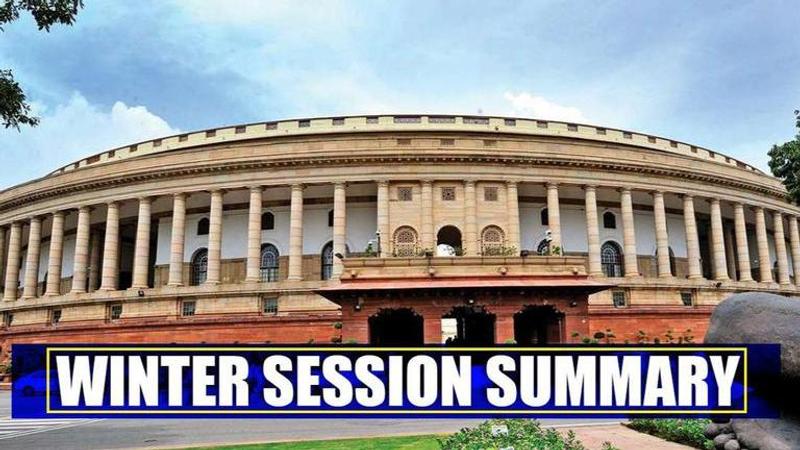Published 17:25 IST, December 13th 2019
Winter Session: Parliament passes 14 of 18 bills, Lok Sabha achieves 114% productivity
After the closing of the Winter Session of the parliament on Friday, the productivity of the Lok Sabha stands at 114% and the Rajya Sabha stands at 94%.

After the closing of the Winter Session of the parliament on Friday, the productivity of the Lok Sabha stands at 114% and the Rajya Sabha stands at 94% respectively, according to PRS. In this session the Lok Sabha has spent over 130 hours of which 55.6 hours have been on legislative issues, states PRS. Moreover, the Rajya Sabha which has clocked in 105 hours, spent 55.4 hours on legislation. The winter session which commenced on November 18 ended on December 13 prematurely, after both houses were suspended due to furore over Rahul Gandhi's 'Rape in India' comment and Opposition protests over CAB.
Source: PRS
Bills discussed and passed
According to PRS, 17 bills were introduced - all in Lok Sabha of which 10 new bills have been passed in both houses. Only one bill - The Central Sanskrit Universities bill which was passed by the Lok Sabha is yet to be tabled in the Rajya Sabha. Overall 18 bills were debated upon, 14 bills have been passed by both houses, the Personal Data Protection Bill has been referred to a Joint committee and the Surrogacy Regulation Bill has been referred to a select committee.
Here are the key bills passed:
- The Citizenship (Amendment) Bill, 2019: The most contentious bill of the session amends the Citizenship Act 1955 to make refugees who are Hindus, Sikhs, Buddhists, Jains, Parsis and Christians from Afghanistan, Bangladesh and Pakistan, eligible for citizenship. Moreover, the Bill exempts exempt the inner line permit areas in Nagaland, Mizoram and Arunachal Pradesh and areas falling under the Sixth Schedule in the region and will be applicable to the members of these communities having arrived in India on or before December 31, 2014.
- The Special Protection Group (Amendment) Bill, 2019: This Bill had two major changes - only the Prime Minister of the country and the family that resides with him immediately will be given SPG security and a former Prime Minister will be provided SPG cover only for a period of five years after he or she leaves the office.
- The Transgender Persons (Protection of Rights) Bill, 2019: This bill makes a requirement for an individual to acquire a "transgender certificate" from the District Magistrate - making medical examination a pre-requisite to be certified as a 'transgender'. While applying for a change in gender certificate, this certificate has been made mandatory, upholding the rights of self-identification.
- The Personal Data Protection Bill, 2019: The Bill aims to lay down a framework for the processing of personal and private data by public and private entities, allowing exemptions for certain kinds of data processing, such as processing in the interest of national security, for legal proceedings, or for journalistic purposes. It also has a data-localization clause, which states that certain critical personal data must be stored solely within the country and also calls for national-level Data Protection Authority (DPA) to be set up.
- The Surrogacy (Regulation) Bill, 2019: This Bill prohibits commercial surrogacy allowing only altruistic surrogacy (surrogacy which involves no monetary compensation). The Bill also states that the intending couple should have a ‘certificate of essentiality’ and that the surrogate mother must be a close relative of the couple, a married woman between 25-35 years and possesses a certificate of medical and psychological fitness for surrogacy.
Time spent on legislation:
PRS also explains that on an average, the Lok Sabha discussed a Bill for 3.6 hours while Rajya Sabha discussed for 3.1 hours. The longest debate in both houses was on the Citizenship amendment bill where the Lok Sabha clocked in 7.5 hours, while the Rajya Sabha spent 8.9 hours. This session which also marked the 250th session Rajya Sabha incidentally also saw 179 days since the Lok Sabha not appointing a Deputy Speaker.
Source: PRS
Updated 17:47 IST, December 13th 2019






